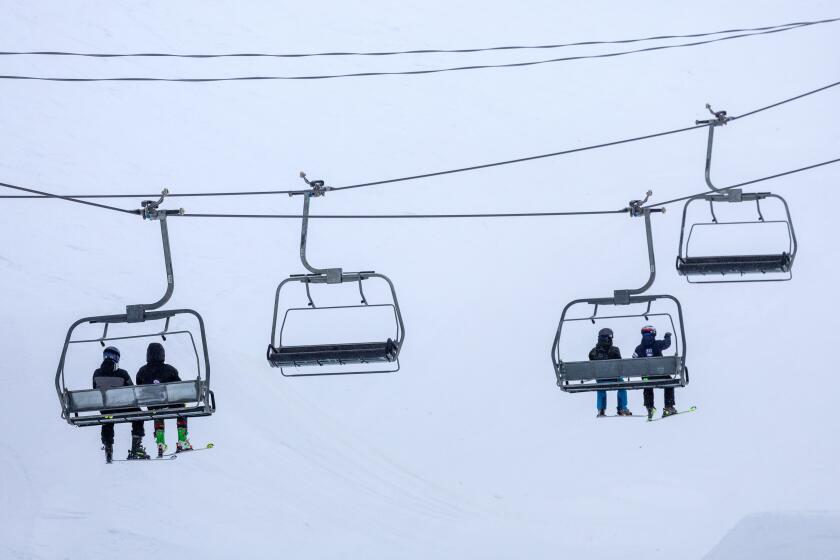Understanding Where They’re Coming From
- Share via
Kim Luu and her six co-workers never see the callers’ faces.
They will never meet 42-year-old Tranh Tran and her cash-strapped Westminster family, never hug the terrified 70-year-old woman who has just been evicted and never personally comfort the battered women seeking divorces but petrified of losing their immigration status.
But they’ve talked. And that’s enough to touch the callers’ lives.
Luu and her colleagues work at a toll-free hotline, the Asian Language Legal Intake Project. They use their language skills and experiences--Luu’s family fled North Vietnam when she was an infant--to add resonance to their advice.
With their fluent Vietnamese and Mandarin, they help Tran understand her family’s eligibility for Medi-Cal and food stamps, assist the 70-year-old woman in finding a place to live and advise abused women how they can stay in the country while staying away from their husbands.
Through the free hotline, which officially made its debut last week, Luu and other project employees calm anxious callers and even elicit laughs from those who don’t know where else to turn.
“These people are desperate for information,” said Juliet Stone, 29, the project’s supervising attorney. “This is so needed in the community.”
The project links four legal service organizations in Los Angeles and Orange counties--the Asian Pacific American Legal Center, the Legal Aid Foundation of Los Angeles, Neighborhood Legal Services and the Legal Aid Society of Orange County.
Callers dial (800) 267-7395 for Vietnamese-language assistance, or (800) 520-2356 for Mandarin. An employee records personal information and determines, on the basis of income and place of residence, if a caller is eligible for assistance. After a two-month pilot program, the hotline is now in full operation. Plans are to expand the effort to include Korean and Khmer, the main Cambodian language, by next year.
A confused Tran called Luu a few weeks ago seeking advice on Medi-Cal, a term she had heard since arriving two months ago from Ho Chi Minh city, the former Saigon.
“A lot of these people come from an inherently repressive regime,” Luu said. “They don’t think of going to the government for assistance and public benefits.”
Luu recorded Tran’s basic information and described Medi-Cal’s medical assistance programs, advising Tran of her rights and finding a location close to Tran’s Westminster home where she could apply.
The hotline staff can elicit information that would be difficult, if not impossible, in English. Luu recently spent an hour on the phone with a distraught woman.
“She just kept crying,” Luu said. “We have to be extremely patient with them.”
The woman had called the day before she was to be evicted from her apartment. After coaxing information from the woman, Luu called the elder-abuse hotline. Although the woman was evicted, Luu’s resourcefulness and a social worker’s efforts found her a place at a senior citizens facility.
“We’re looking for a new way of serving the underserved community,” said Bob Cohen, executive director of the Legal Aid Society of Orange County. “Anything we can do to get out in the community, to make folks aware of how easy it is to get service, that they won’t be ripped off, is important.... “
According to census data, the Vietnamese population in Orange County jumped by nearly 89% between 1990 and 2000, while the Chinese population increased by 44%.
In Los Angeles County, the Vietnamese population rose nearly 25% in the decade, while the Chinese population leaped by more than 34%.
More than 1.5 million Asians and Pacific Islanders now live in the two counties. Many have little or no English skills.
Stewart Kwoh, president of the Asian Pacific American Legal Center, said the idea of a hotline had been tossed around for years. But the latest census figures and an influx of grant money convinced center staff members that the time had come to begin the program.
Kwoh’s efforts have raised more than $300,000 from the Open Society Institute and the Community Technology Foundation of California to anchor the hotline.
Staff members have appeared on Vietnamese radio and Mandarin television to publicize the program.
Tran called the hotline after her sister heard Luu on Bolsa Radio, 106.3 FM. The broadcasts have made Luu a celebrity of sorts. Callers regularly greet her with: “Ms. Kim, I have this problem and I need your help.”
In part, hotline workers gain immigrants’ faith because they understand where their callers are coming from--literally.
When she glances down at the tattoo on her right forearm, staff attorney Anita Le’s forehead furrows in pain at the bold black letters that spell out “Le Quang Thai Ha.” That’s the name of the sister who never made it out of Vietnam--who at age 15, drowned when bullets tore through the boat in which she was trying to escape.
“We never forget where we came from,” said Le, 29, who arrived in the United States six years after her sister’s death. “We’re in a vacuum without helping others.”
Stories stream from Luu, too, of how she and her parents fled North Vietnam in 1979. She described how her family sat waist-deep in water for two weeks on a leaky fishing boat to Hong Kong, how her father gave up his own ration of rice to feed his family, how they settled in Louisville, Ky., with $100 and a gold wedding ring among them.
“Right now, I’m giving back to the community I grew up in,” said Luu, 24, who lives in Alhambra. “The fact that I speak Vietnamese every day reconfirms that I’m still very Vietnamese.
“Even though I’m American, I can relate to them. I understand the depths of their pain.”
*
Times researcher Maloy Moore contributed to this report.
More to Read
Sign up for Essential California
The most important California stories and recommendations in your inbox every morning.
You may occasionally receive promotional content from the Los Angeles Times.










